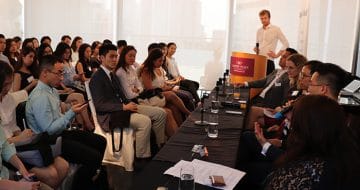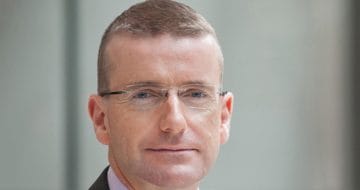Ahead of next week’s Staying Set for Success virtual event which focuses on ‘Life as a global business lawyer in Hong Kong’, ULaw’s Peter Crisp shares his predictions for legal life after COVID-19

Nine months have passed since The University of Law’s (ULaw) new Hong Kong campus welcomed its first group of aspiring lawyers through its doors.
Hong Kong’s reputation as a global hub for finance, commerce and international dispute resolution, with a strategic gateway to mainland China, makes it an ideal location for aspiring corporate lawyers to start their careers. Home to over 900 law firms, the city-state was “an obvious place to start our first international law school”, reflects Peter Crisp, ULaw’s Hong Kong campus dean and pro vice-chancellor external.
Commenting on ULaw’s progress in Hong Kong so far, Crisp, a qualified barrister who specialised in property law, says “we’re very, very pleased in how the new campus launched in what, to be frank, are very difficult circumstances.”
Indeed, it’s been a challenging year for Hong Kong. The global pandemic has dealt a heavy blow to the city’s economy, with tourism and retail spending already in steep decline following last year’s prolonged anti-government protests and the US-China trade war. As the global economy faces its deepest recession since the 2008 financial crisis, many international law firms have resorted to financial measures such as pay cuts and the furloughing of staff.
Crisp, however, remains confident that the financial hub will recover. “Hong Kong, as I hope this country [the United Kingdom] will do, will bounce back very quickly and will have an upward swing in the economy once we come out of full lockdown,” he forecasts.
Lawyers will play a major role in this recovery. “Hong Kong remains a very dynamic enterprising and entrepreneurial place for business — and businesses need support from lawyers,” says Crisp. “Ever since the territory was founded, lawyers have been at the forefront supporting and advising business and finance. And that’s not going to change.”
The pandemic has also presented new challenges for law schools. “Hong Kong was our first campus to experience lockdown,” Crisp reveals. In February, following Hong Kong’s government guidelines, ULaw suspended face-to-face teaching and “efficiently and effectively” moved 40 students from traditional lecture theatres to online classrooms. “Unlike the demonstrations, which may have been disruptive to travel, COVID-19 is a serious question of complying with health and safety requirements,” says Crisp.
Now, ULaw students are returning to campus, ready to undertake exams, following the relaxation of social distancing restrictions. “We’re fortunate that our classrooms in Hong Kong are actually very large, so we’re able to teach face-to-face while social distancing with students,” says Crisp. Interactive online technology, however, will still be used for collaborative breakout activities. “In the old days, pre COVID-19, we might have asked students to gather around a whiteboard, to brainstorm or write-up their ideas. So, you just have to be flexible and rethink some of the activities that took place in the physical classroom,” he explains.
Such flexibility is welcomed, particularly as mass pro-democracy demonstrations restart after a pause during the COVID-19 outbreak. “Our number one priority is the safety of our students and staff. Where there is concern for demonstrations, we monitor the situation on an hourly basis and if necessary, we can switch the teaching online,” says Crisp.
While demonstrations have led to clashes between Hong Kong protestors and the police, conflict is often localised, stresses Crisp, who spent much of last year in Hong Kong working closely with international law firms, the local legal community and its regulators, including the Hong Kong Law Society. “Apart from travel disruption, you wouldn’t really know demonstrations were happening unless you happened to be in the place in which they were happening. That’s not to diminish the impact on those who were disrupted, but overall ULaw has been more impacted by COVID-19 than the demonstrations,” he explains.
Eased restrictions have also seen many employees return to the workplace. Measures to protect office workers have included staggered lunchtimes, mandatory temperature checks at reception, plastic partitions between desks and restrictions on elevators. Meanwhile, applying the lessons learnt during the 2002-2004 SARs outbreak, Hong Kong’s residents have long been equipped with face masks, hand sanitiser and adhering to social distancing rules.
Others, however, prefer to keep working from home. With COVID-19 showing that employees can perform efficiently away from the office, Crisp believes this change will long-outlive the pandemic. “I suspect in this country we’ll see a permanent shift in the way in which people work, as people start working in more agile, flexible ways,” says Crisp.
He also predicts that businesses, including law firms, will experience mounting pressure from clients to adapt. “Clients walking into a big glass building will now be thinking: ‘Do my fees that I’m paying to my professional advisers, pay for this? And is that strictly necessary any longer?’”
As such, the post COVID-19 world could see law firms re-examine their expensive workspaces and instead opt for smaller hubs more suitable for in-person meetings and collaborative work. Video conferencing tech has proved a sophisticated alternative during lockdown, but Crisp believes it’s still important to maintain the social element that comes with being in a physical workplace. “Although you can do a lot through screen-to-screen, in the end, face-to-face meetings have something special and unique about them,” he says.
Preparing its students for the ‘new normal’ aligns with ULaw’s aim to offer employability-focused training, ensuring candidates are well-rounded and can make a difference in law firms from day one, says Crisp. Since launching last year with the Graduate Diploma in Law, ULaw Hong Kong now offers a broad mix of LLM programmes. Crisp also reveals that the campus will offer preparation courses for Hong Kong’s new standardised qualifying exam, The Law Society Exam.
Looking ahead, Crisp is preparing for ULaw’s further expansion into cyberspace with the launch of its online campus in September. “In normal times, pre COVID-19, we had about 1,000 students studying online. My prediction is that this number will increase exponentially for a number of reasons — not least because of the experience people have had with COVID-19,” he says.
Peter Crisp will be speaking alongside lawyers from the Hong Kong offices of Clifford Chance, Herbert Smith Freehills, Linklaters and Mayer Brown at ‘Life as a global business lawyer in Hong Kong’, a virtual student event taking place on Tuesday 9 June at 4pm Hong Kong time. You can apply to attend the event, which is free, now.
About Legal Cheek Careers posts.


